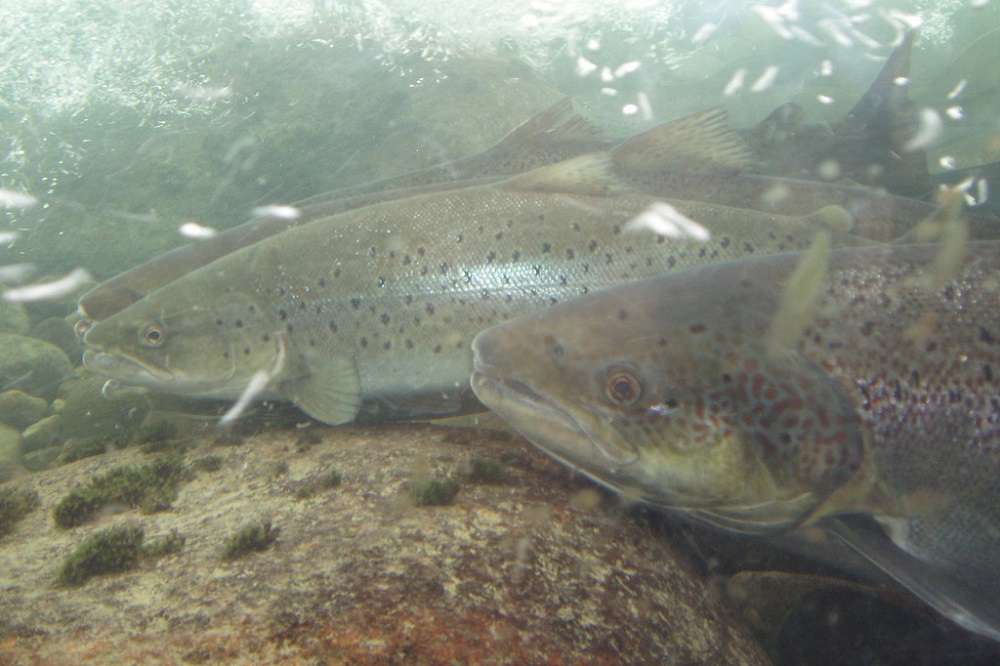Conservation group helps save Wye salmon from heat death

Gavin McEwan, local democracy reporter
Salmon in the lower river Wye narrowly avoided death by overheating this week, thanks to prompt action by a conservation group.
Atlantic salmon, for which the river is renowned, perish when water temperatures rise above 27C.
Fearing a repeat of the major “fish kill” in the river during the heatwave of 1976, the Wye & Usk Foundation (WUF) persuaded Welsh Water and Natural Resources Wales to release water from the Elan valley reservoirs in the river’s headwaters at the end of last week to boost its flow and flush out warmer water.
The group also urged farmers along the river to “halt where possible, or limit if not, their water take from the Wye on Sunday, Monday and Tuesday to ensure this release of water reaches the fish it is intended for”, according to an email it sent out.
Some residents along the river took to Twitter over the weekend to point out that individual farms were still abstracting, and irrigating crops with spray guns.
But WUF chief executive Simon Evans said today (July 20) that enough farmers had heeded its call to bring a rise in the river level, even before the effect of the reservoir release was felt.
As a result, “apart from a few dead fish around Holme Lacy, what we feared would happen, didn’t”, he said, adding the salmon can now be seen active once more as temperatures cool down.
“We don’t yet know if the releases were key,” he said. “We will have to analyse the data from the past few days, and learn some lessons so we can respond better next time.
“But it shows what can be done if everyone works together.”
Extraordinary
Hereford and South Herefordshire MP Jesse Norman, a frequent critic of the statutory bodies responsible for the river, said it was “extraordinary” that it has taken the intervention of WUF, a charity, to address this “serious problem”.
“In an ideal world, we should expect agencies, regulators and government to respond collectively and quickly to this kind of challenge,” he said.
“We will need them to do so as these events become more frequent.”
Mr Norman recently convened a cross-border working group of agencies, local authorities and other key parties to address the state of the river.
He said that while this will initially focus on phosphate pollution in the river, it could in future also address wider issues such as low flows.
Meanwhile, the combination of pollution, heat and low rainfall means river’s wildlife is still not out of danger, with “blooms” of algae, which can be lethal to water life, reported to have reappeared in some stretches.
Posting a photo of the river at Foy Birdge south of Ross-on-Wye, Juraj Mikurcik tweeted: “Peasoup river #Wye – I’ve never seen the water so low and polluted”.
https://twitter.com/JurajMikurcik/status/1548949598458216448?s=20&t=nDp_lN9d_yvgGqi4_VCTwg
“The algal blooms will always be back because of the phosphate problem,” Simon Evans said.
“Either you reduce the number of animals in the catchment, or you extract the phosphate from the manure, bag it up and send it to parts of the country where it’s needed like the east of England, rather than importing it.
“We are working with farmers to put the technology for that in place and to get it funded.”
The UK Government’s Environment Agency says incidents of dead or distressed fish in rivers and lakes should be reported on its incident hotline number, 0800 80 70 60.
It has also developed a new algal bloom early warning system for the river Wye.
Support our Nation today
For the price of a cup of coffee a month you can help us create an independent, not-for-profit, national news service for the people of Wales, by the people of Wales.





